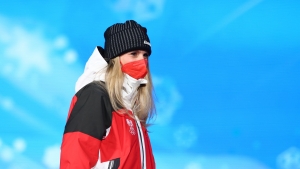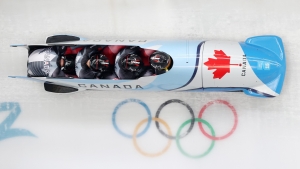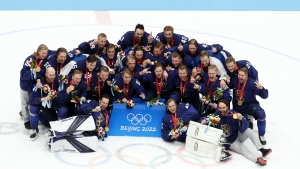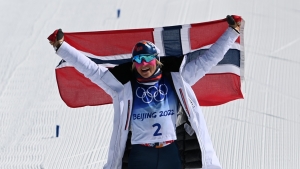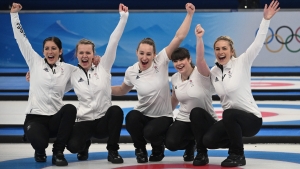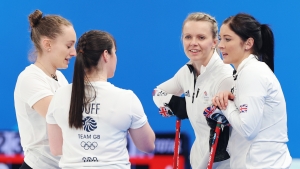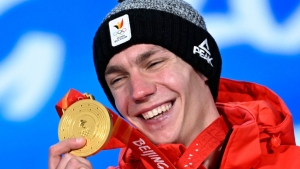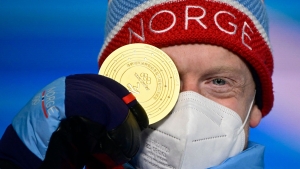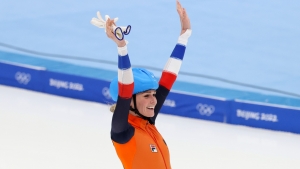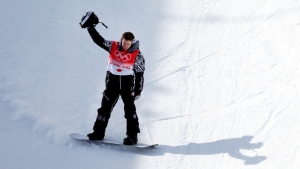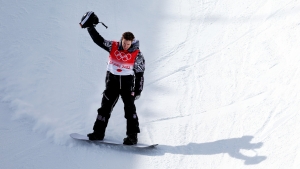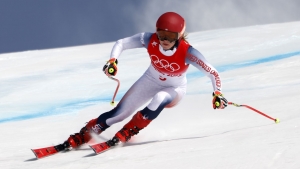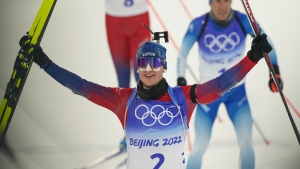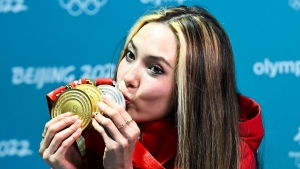Eileen Gu told herself she was the best before going out and proving it as China's home Winter Olympics superstar landed a second gold medal of the Games in Beijing.
The United States-based teenager triumphed in the women's freeski halfpipe, posting a best score of 95.25 to win comfortably from the Canadian pair of Cassie Sharpe and Rachael Karker.
It made Gu, at the age of 18 years and 168 days, the youngest athlete to win three individual medals at any single edition of the Winter Olympics.
Dubbed the 'Snow Princess', Gu said the Olympic experience had been a life-changer.
"It has been two straight weeks of the most intense highs and lows I've ever experienced," she said. "It has changed my life forever."
After gold in the freeski big air and silver in slopestyle, this was her sign-off event at Beijing 2022, with Gu delivering a mesmerising display of agility and skill after giving herself a pep talk.
"Instead of looking to other athletes and being like, 'Oh, what are they doing? How can I be like them?', I try to build myself up more," Gu said. "So, it's the opposite of what I do in training, but at the top I said, 'My name is Eileen Gu, and I'm the best halfpipe freeskier in the world'."
Gu burst into tears as her achievement sank in. She also cast a little doubt over her future in the sport. Asked if she might consider competing for the USA in future, Gu said: "I have no idea what I'm even doing next year. I'm going to go to college, but in terms of skiing competitively, am I going to continue competing? Who knows?
"I love skiing and I would love to continue competing, but in terms of resources and time and, you know, what else I'm juggling. It just depends, right? I'm going to do whatever feels right and hopefully be able to create some kind of positive change out of any decision that I make."
Medals record for Norway
Johannes Thingnes Boe's fourth biathlon triumph in Beijing established a Winter Olympics landmark as it gave Norway a 15th gold medal, a record haul for a single edition of the Games.
Norway were already the most successful nation in Winter Olympics history, and they have been hammering home that status over the past fortnight.
Boe's latest run to glory came in the 15km mass start, which he won by 40.3 seconds from Sweden's Martin Ponsiluoma. Norway also took bronze through Vetle Sjaastad Christiansen.
The 28-year-old Boe, who also has a bronze from the 20km individual, enjoyed having a team-mate on the podium and said of Norway's record feat: "I feel really proud. We have both been a part of it, winning gold today and also in the men's relay where Vetle won a gold medal for us, so we are making history and as a nation we are really proud."
Norway also landed silver and bronze in the women's 12.5km mass start, which was won by France's Justine Braisaz-Bouchet, ahead of Tiril Eckhoff and Marte Olsbu Roeiseland.
Roeiseland's bronze gave her a fifth medal in Beijing, a second third-place finish to add to three gold-winning performances, and she said: "I was maybe not at my best in this cold, but I really tried to fight, and it was so fun to race with Tiril today, we raced the whole race together and the position in the standing was really tough. Today I'm just so happy with the bronze, for me it was like gold actually."
Champion Braisaz-Bouchet said: "I was so shocked I won. I'm really happy to say I'm Olympic champion. It's quite amazing."
Regez leads Swiss cross double
Ryan Regez and Alex Fiva delivered a Swiss one-two in freestyle's men's ski cross, with champion Regez finding the equilibrium he had been seeking all week when it mattered most.
"I've been really nervous for the whole week," Regez said. "It's my first Games and the last big event was the World Championships last year, which Alex won, and I was just super nervous there as well and I was skiing in my head, so thinking whilst skiing and there I messed up.
"Today it was just a lot of pressure on me because I won the last two World Cup events. I'm in the lead of the overall World Cup so for sure everyone was just hoping I would come here and take the victory and eventually it worked out, but there was just so much going on, so much pressure. I phoned a lot with family, friends, and yesterday I had a long talk with my coaches.
"That just calms me down a lot and that was really important. Today actually I wasn't nervous at all, which was quite unusual. In the morning, yes I was, but then as soon as I went on the mountains everything was gone and I just could ski free."
Dutch skaters back up to speed
Thomas Krol delivered a fifth long-track speed skating gold medal for the Netherlands team, but a first for eight days after the wins began to dry up.
Krol's victory came in the 1,000 metres, as he edged out fast times from Canada's Laurent Dubreuil and Norway's Haavard Holmefjord Lorentzen.
"It's really hard to express all the emotions that are going through me, a dream just came true," said the 29-year-old, who has aspirations to become a pilot when his sporting career ends. "I'm so intensely happy that I made it. It means everything.
"I was expecting my time not to be fast enough because there were more great skaters coming. So, it was a nerve-wracking 10 minutes for me."
Dubreuil put disappointment at missing out on gold into context, saying: "My daughter especially helped me. She is just three years old, and she doesn't care about my results. Seeing her not even one per cent sad after my race when I called them, she was running around and having so much fun, running and jumping and yelling. It made me realise, it's just sport."
























